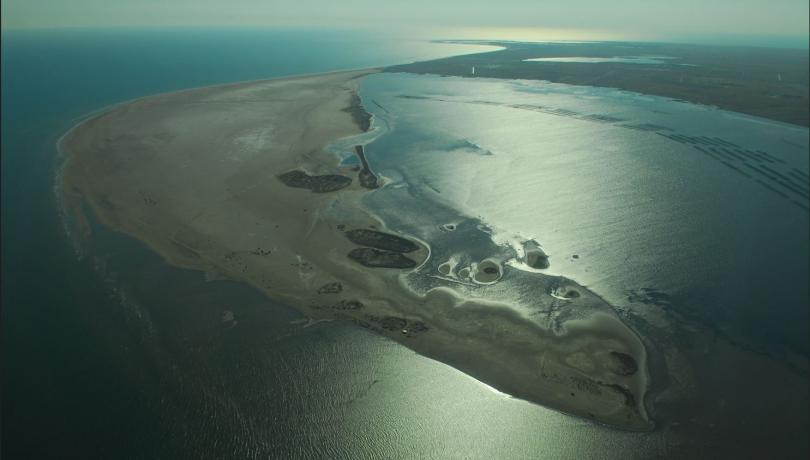The work, co-produced by the ICM, has received the first prize in the category of Single Work, which is endowed with 2,000 euros.

The jury of the CSIC Outreach and Citizen Science Awards has agreed to award the first prize in the Single Work category, worth 2,000 euros, to the documentary 'Tales of global change: the Ebro Delta', the first chapter of an audiovisual series funded by the FECYT, co-created and produced by the Institute of Marine Sciences (ICM-CSIC) and the science outreach association La Ciència Al Teu Món (LCATM).
The jury, composed of specialists in popularization, research and education who work inside and outside the CSIC, has highlighted its social approach and its way of integrating science in a transversal way, giving voice to different sectors of society and proposing an integrative approach to address global change in a given territory.
Specifically, the film, directed by Roberto Torres (LCATM), presents the story of a delta, the Ebro, which has undergone significant changes in recent decades. The protagonists talk about these changes produced both by the natural dynamics of the environment and by anthropogenic activity, but also about how they have adapted to them to survive.
"Global change is a considerable challenge that has been ongoing for decades, which makes it essential to adopt a constructive perspective. Without dismissing the gravity of the situation, the documentary focuses on people's adaptation strategies in a changing territory. It is vital to share inspirational stories of people and communities in a changing territory. It is vital to share inspiring stories of people and communities that are making significant progress in this area, because by telling these success stories we provide concrete examples of how we can effectively address environmental challenges," says Esther Garcés (ICM-CSIC), scientific director of the documentary.
For his part, Jordi Camp (ICM-CSIC), also scientific director of the documentary, said "we thought that, in the face of catastrophism and despair, it was worth looking at the adaptability of the primary sector, which faces a changing environment daily, integrates it into its activity and manages to feed us all".
In total, 106 works were submitted to the Awards, of which 6 were awarded, either with the first prize or with a second prize in the categories of Unitary Work, Dissemination Project and Citizen Science Project. The jury highlighted the high quality and diversity of all the projects presented.
In the Single Work category, the runner-up prize went to the online graphic adventure 'Aina and the Hammer Community', an initiative with the participation of the Spanish Geological and Mining Institute (IGME-CSIC) and the Institute of Geosciences (IG, CSIC-UCM). The jury pointed out that the proposal highlights the value of geological heritage in an original way, with quality content and an approach aimed at young audiences, as well as giving visibility to women in science and raising awareness of the role of women in science.
On the other hand, in the category of Outreach Project, the educational program 'Scientists in practice' has received the first prize of 3,000 euros for its ability to involve multiple research groups from different scientific areas, for giving students from underprivileged backgrounds the opportunity to come into contact with research and for the quality of the evaluation of the initiative. The project is promoted by the Institute of Philosophy of the Center for Human and Social Sciences (CCHS-CSIC) in collaboration with the Spanish Association for the Advancement of Science.
The project 'The Accessible Garden', of the Royal Botanical Garden (RJB-CSIC), has won the runner-up prize of 1,500 euros, for welcoming diverse groups and making them protagonists of this great space for research and dissemination, as well as for the ability to involve research and technical staff in the proposal.
In the category of Citizen Science Project, the first prize of 3,000 euros was awarded to the initiative 'SAFE, Stop Atropello de Fauna en España', with the participation of the Doñana Biological Station (EBD-CSIC). The jury highlighted its innovative nature in the field of citizen science, the soundness of its scientific objectives and the high quality of its work methodology and open access.
The runner-up prize of 1,500 euros went to 'Melanogaster: Catch The Fly! Citizen science in adaptive genomics', from the Evolutionary and Functional Genomics Laboratory (González Lab) Institute of Evolutionary Biology (IBE, CSIC-UPF) and the scientific dissemination association LCATM, for its long history, its implementation in the educational community and for the quality of its scientific objectives, approach and materials.
"The awards are a strategic action of the Council to promote initiatives that make scientific and technological advances in the various branches of knowledge available to the non-specialized public," explains Pura Fernandez, deputy vice president of Scientific Culture and Citizen Science of the CSIC, the unit that organizes the awards.
"In this second edition, the initiative has had a great participation of CSIC staff, who have submitted 58 proposals to the category of Outreach Projects, 10 to the Citizen Science Projects and 38 to the Unit Work, which shows the great work in scientific culture carried out by the centers and units of the institution," she adds.
The awards ceremony will take place on Friday, June 21 at the CSIC headquarters in Madrid.